Food ads that twist the truth

It’s hard enough for people to eat a healthy diet. Yet food companies make it tougher by bombarding us with ads that twist the truth just enough to make whatever they’re selling stand out. Gee, thanks.
Here’s the latest set of marketing ploys.
Burger King breaks the mold
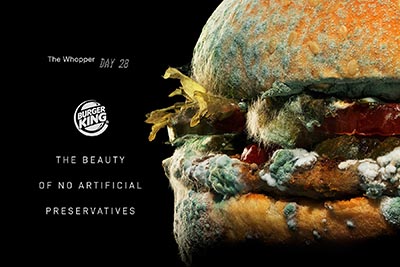
“Burger King, are you okay?” asked the Washington Post in an article on the Burger King Whopper ad.
It’s not clear if customers—even those who care about artificial preservatives—will ever shake that image of a burger slowly decaying into hairy green mold. Or if “the beauty of no artificial preservatives” means that customers should expect Whoppers to be moldy.
But image aside, the changes that the chain is making to its signature burger are (yawn) trivial.
Burger King will now add lactic acid instead of sodium benzoate to the pickles, use cultured wheat flour instead of calcium propionate in the bun, and cut the EDTA out of the mayo.
Fine. But sodium benzoate, calcium propionate, and EDTA are safe for most people. (Benzoate can cause reactions like hives in people who are sensitive to it.)
And is a food any healthier because it replaces calcium propionate with bacterial cultures that make propionate (or its close cousin, propionic acid)? Or does it just sound better for you?
Apparently, that’s the name of the game.
C scam
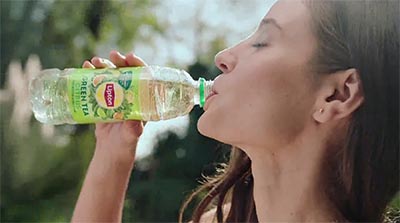
“Antioxidant vitamin C makes our Lipton green tea even better,” says the TV ad featuring Lipton Citrus Green Tea.
Really? How does a dose of vitamin C make a bottle of mostly water and sugar better?
Odds are, the tea’s 100 liquid calories won’t curb your appetite for other foods, so you’ll end up with a surplus.
Vitamin C can’t fix that. Its goal: to give a sugary drink a health halo.
Not veggie nice
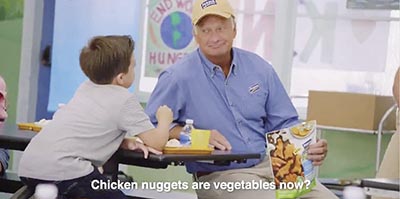
“Who here loves vegetables?” ask the guys from Perdue as they enter a cafeteria full of schoolchildren. Boos and eews all around.
“Who likes chicken nuggets?” Yay, shout the kids, who gobble them up...until the Perdue folks ask, “How did you guys like the vegetables in the chicken nuggets?” Shock and dismay.
“New Perdue Chicken Plus,” says the voice-over, “with a quarter cup of veggies hidden in every serving.”
Thanks, Perdue, for perpetuating the idea that children hate vegetables. If they didn’t before, this ad may do the trick. Veggie-bashing aside, what’s in those two lines of teensy type at the end of the ad?
First, the fine print explains that the “100% all natural ingredients” on the label isn’t really 100%. “No artificial ingredients except for texturized wheat protein,” it clarifies.
Then comes this: “One serving of this product does not provide a full serving of vegetables (½ cup). The USDA recommends 2½ cups of vegetables daily.”
So instead of trying to find out which delicious veggies their kids like, parents should sneak four tablespoons’ worth into a serving of chicken nuggets?
Good plan...if your only goal is to sell chicken.
The fine print

“1 bowl & you’re good till lunch,” says the Kellogg’s Frosted Mini-Wheats ad.
Kind of sounds like Mini-Wheats keep you full longer than some other breakfast foods. But wait! See that fine white print?
“With 2% milk, at least half of adults had a lower desire to eat than before breakfast for 3½ hours.”
Translation: People who ate Mini-Wheats with milk were less hungry after breakfast than before.
Wouldn’t that be true for, well, any breakfast? We asked Kellogg for details about the study’s design.
“We are working on a response,” they told us the following week.
A week after that, as we were approaching our deadline, came this: “We will not be able to provide a response within the next couple weeks.”
Is it that complicated? Or just embarrassing?
A little bit sneaky
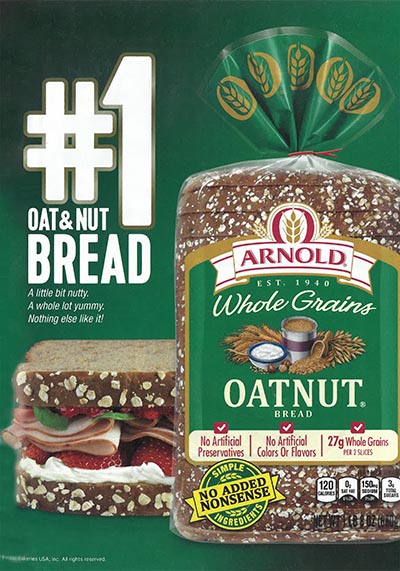
“A little bit nutty. A whole lot yummy. Nothing else like it!” boasts the ad for Arnold Oatnut Bread.
A little bit nutty is right. The bread has more yeast than any of its nuts (hazelnuts, walnuts, almonds).
What’s more, that can’t-miss “Whole Grains” on the label may lead shoppers to expect no white flour (wrong, though it does have more whole wheat than white).
And Arnold boasts about the “27g Whole Grains per 2 Slices” while highlighting the calories (120) in just 1 slice.
“No added nonsense,” says the label. Nope. Just your typical Madison Avenue tricks.
Super surplus
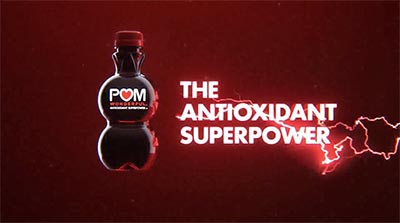
“The antioxidant goodness in every bottle of POM Wonderful makes it a potent weapon against free radicals,” says the TV ad.
The backstory: In 2015, a federal appeals court ruled that POM had too little evidence to claim that pomegranate juice can treat or prevent prostate cancer, heart disease, or erectile dysfunction. The POM-has-antioxidants claim may be the only one left. But can antioxidants treat or prevent any disease? Not as far as we know.
What we do know: Each 16 oz. bottle has 320 calories. And, like any liquid calories, they’re likely to pad your daily intake. Not the superpower you were hoping for?
Not so natural
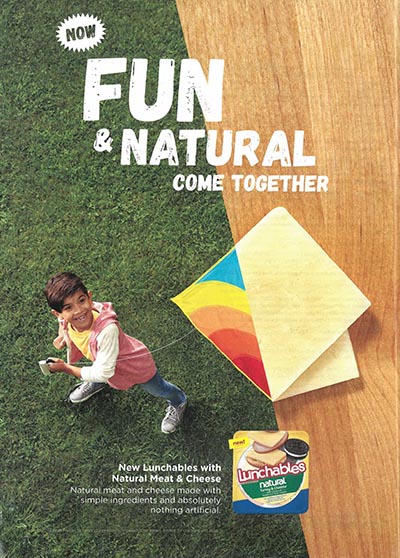
“Now fun & natural come together,” says the ad for Lunchables Natural Turkey & Cheddar with Crackers & Double Stuf Oreo Cookies.
Natural?
Can you see that barely visible kite-string-sized line in the grass at the very bottom of the ad? It’s actually a sentence: “No artificial ingredients, minimally processed, except for crackers and treat.”
So only half the lunch is natural? And who cares if the turkey is “natural” when it still gets added nitrates and nitrites from cultured celery juice.
It’s more like “fun & fool-the-parents come together.”
Photo (top): Burger King.
Topics

